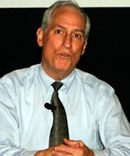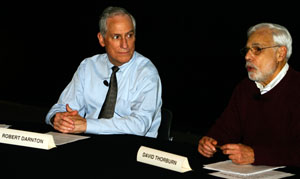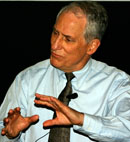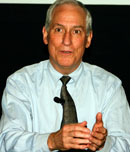| Books and Libraries in the Digital Age |
||||
|
Thursday, Oct. 16, 2008 Robert Darnton is the director of the University Library and the Carl H. Pforzheimer University Professor at Harvard. A former Rhodes Scholar and MacArthur Fellow, his books include The Business of the Enlightenment: A Publishing History of the Encyclopedie, The Great Cat Massacre: And Other Episodes in French Cultural History, and The Forbidden Best-Sellers of Prerevolutionary France. Moderator: David Thorburn is professor of literature and director of the Communications Forum at MIT. He is the author of Conrad’s Romanticism, and, most recently, co-editor of Rethinking Media Change: The Aesthetics of Transition. A podcast of Books and Libraries in the Digital Age is now available. A webcast of Books and Libraries in the Digital Age is now available. By Helene Moorman Photos by Greg Peverill-Conti [this is an edited summary, not a verbatim transcript]
Robert Darnton began with an account of his brief career as a reporter. His father, a well-known reporter for the New York Times, died covering the Pacific during World War II. Darnton was fascinated by his father's story and aimed to follow in his footsteps. He trained to be a journalist, but decided only three months after being hired by the New York Times that history was his true calling. News, said Darnton, is a cultural construct journalists learn to create only through experience. A reporter’s essential skills -- how to write a lead sentence, how to write quickly, how to be accurate-- are useful to historians, and Darnton believes that graduate students in history would profit from working on a daily newspaper. Moderator David Thorburn suggested that the clarity and precision of Darnton's prose might owe something as well to the fact that he earned his doctorate in England instead of the United States. Darnton agreed that British expectations for graduate students were different from prevailing American ideas. He said his Oxford professors were scornful of the American Ph.D. At Oxford, students were required to write essays each week and read them to their tutors, a practice that stressed the importance of clear, unaffected prose. In Darnton's opinion, English historians generally write better than Americans, in part because of this experience. At Oxford, Darnton absorbed archival history, and he grew to love the experience of opening a box of old manuscripts. When he teaches seminars, he likes to show his students a set of archived interrogations from the Bastille, in which one can follow along as the questioner lays traps for the prisoner. This type of document opens a perspective into the lives of people who lived in the past. But archival materials do not make history. History is a story, assembled from those raw materials, that helps us understand the human condition as it was lived in another time. Thorburn asked why Darnton often chose to work with archival records that earlier historians would have considered irrelevant. Darnton discussed the idea of "history from below," which aims to recover the experience of a society's ordinary citizens in addition to its great leaders, thinkers, and artists. Inspired by the picture of the human condition that results from this approach, Darnton became interested in minor or forgotten writers. He found a fascinating archive of police reports on writers in Paris between 1748 and 1752. It included fascinating information on each figure: his age, origins, life story, even physical appearance. In addition entries for such famous writers as Voltaire and Rousseau, there were records of hundreds of lesser authors no one had heard of. Using this material, Darnton attempted to get at "literature from below," aiming to uncover the lives of these hack writers of the Enlightenment. The conversation then shifted to the discipline known as the history of the book. Darnton argued that "the book" in this context really means communication in general, and that the field includes the study of many expressive formats in addition to books. The point is to try to understand how words shape consciousness and how they become a force in history. In his career, Darnton has tried to map out a total history of books by applying the practice of history from below. This involved tracing a communication circuit that included not just author and publisher, but the smugglers and wagon drivers who transported books, the book sellers and libraries that distributed them, and the readers who consumed them and indirectly influenced the writers. Some of Darnton's research into publishers of 18th century French books has revealed fascinating information about the sociology of literature. Because of the active censorship in France at that time, there was a huge market for uncensored books produced just outside the borders of the country. Publishers conducted what amounted to market research, and a thriving smuggling trade (known as assurance, or insurance) existed to get the books into France.
Thorburn asked how the digital age has encouraged or affected the discipline of the history of the book. Darnton said he doesn't believe that new technologies have made books an endangered species. He pointed out that despite complaints by publishers, book production is actually increasing each year. This is not surprising, because the codex is one of the greatest inventions of all time. The digital age has encouraged an interest in book history. Students are fascinated by old books today as they were not 10 or 20 years ago, in part because so much information is available online. In Darnton's freshman seminar on the history of books, he always arranges for a librarian to bring a copy of the Gutenberg Bible to class. The students are allowed to handle this rare artifact; the experience is often transforming, for it contradicts their assumption that all information is online and draws them into a whole fascinating universe. Thorburn asked Darnton to expand on a passage from one of his essays on the role of libraries in the digital age: "Information has never been stable." Darnton explained that people today are under the illusion that the world of information has become more unreliable, in part because the Internet is open to amateurs, ordinary citizens and crackpots. But unreliable information has always been a problem. There are countless examples of faulty texts throughout history. The first published versions of Shakespeare, for example, are riddled with mistakes, and the effort to figure out what he actually wrote has created the whole industry of Shakespeare scholarship. Darnton applied this argument to newspapers as well. He cited a favorite example: completely conflicting accounts of the Battle of Brandywine in the American revolution. A loyalist newspaper in New York accurately reported this defeat for General George Washington. The story was copied and reprinted in Nova Scotia, then Scotland, and finally transmitted to London. But, in London, political factions hostile to the government expressed skepticism about the report. They seized on a passage that quoted Washington as saying he was “arraying my troops” and claimed no general would speak in such a way. This proved, they claimed, that the story was false. (In fact, the phrase was a typographical error: Washington had actually spoken of “arranging my troops.”) Now British papers began to report that Brandywine had been a victory for the Americans, an outcome congenial to many in France, which had supported the revolution. French newspapers then published accounts of the American victory at Brandywine. In some reports, it was falsely reported that Washington had been killed during the battle. In fact, the British press claimed that Washington had been killed on at least four separate occasions during the course of the Revolution. Thorburn summed up the larger point of these examples by saying that people today who claim that the universe of digital information is so unreliable that it should be ignored are naive about the inconsistency of all information throughout history. Darnton agreed, arguing that we should be skeptical of all texts. But, he said, the inconsistencies themselves deserve study because they can have significant historical repercussions. The focus of the field of book history is shifting toward trying to understand the total process of communication and how it affects public opinion. Thorburn's final question concerned the role and responsibilities of both public and research libraries now and in the future. Starting with public libraries, Darnton cited the neighborhood branches of the New York Public Library. They are extremely important in some areas, providing books, videos, CDs, and other types of media, as well as access to computers for many people who don't have them at home. Because of these resources and the computer training offered by many libraries, immigrants, the poor, even small business owners gain access to information technology. Another vital offering of neighborhood branches is English language instruction for immigrants. These are the kinds of important social and practical functions that public libraries should continue to provide and expand. Research libraries have a different fundamental duty, and that is to preserve our cultural heritage. Unfortunately, no one has solved the problem of how to store and preserve digital documents permanently, so we must confront the danger that they will be lost or become inaccessible. Darnton argued that we should not depend on private enterprises like Google to preserve the heritage of print or the enlarging history of digital communications. There's no guarantee that Google will still exist in 20 years. And while Google's project to digitize millions of books is commendable, many mistakes inevitable because the task has been designed and supervised by engineers instead of bibliographers. It is vital for research libraries to continue to collect and make important material available. Darnton believes that libraries will be crucial in shaping the new information age for the benefit of the general public, not just private companies. This challenge led him to accept the position of Director of the Harvard University library. Audience Discussion QUESTION: Would you say more about the new role of the library in the digital era? DARNTON: I believe research libraries have the responsibility to preserve electronic messages like email. A lot of communication is escaping us because it's generated electronically and just disappears. The State Department, for example, began electronic communication in 1970, and thirty years later, when it was supposed to become available for public scrutiny, almost all of it had been lost. QUESTION: What do you think is lost about books when they're digitized? DARNTON: Certain interesting physical aspects of books, like the materials in the paper and the smell are lost of course. But there are gains as well-- sometimes we are able to see new things from the digitized versions of books. In general I don't think that one medium of communication necessarily displaces another. They coexist for a long time. For example, scribal publishing continued to flourish long after Gutenberg, into the 19th century. QUESTION: You've been saying that we should preserve every form of printed and digital communication that we possibly can, but that's an incredibly daunting task for any library. Will libraries have to collaborate more extensively in the future to achieve this?
DARNTON: Yes, libraries need to share the wealth and the work. Some libraries are very protective about their treasures, and don't want them to be digitized. There are political questions involved. I think the Library of Congress should be preserving a lot more, especially ephemeral literature. We need to collect everything, and to do that we need more taxpayer support. Maybe the Library of Congress could be funded by sale of bandwidth. After all, the air belongs to the people, why not use the income to preserve communication for their benefit? QUESTION: What's the status of Google's digitization of Harvard's collections? DARNTON: The Harvard University Library is different from other libraries because half of its collection consists of periodicals, and three quarters of the other half are materials produced outside the United States. We're cooperating with Google to digitize books in the public domain, but it's not clear that Google plans to venture very far into the world of serials and foreign books. We might end up contributing only about one million of our 16 million volumes, which is a disappointment. I would like to see everything in the collection digitized and made available free to the whole world, but I know that's naive and utopian. Not only digitizing, but creating and maintaining the necessary metadata for all of this material is very costly, and I'm grateful that Google is willing to invest the money. So far, it seems to be working correctly and for the benefit of the public, but it's unclear what will happen when the project gets beyond books in the public domain. QUESTION: You've referenced two kinds of instability in your discussion so far. One is information instability, resulting from the fact that all we have are varying accounts, and none of them necessarily correspond to any particular reality. The second is textual instability-- that there may be many versions of any particular text (editions, abridgments, translations, etc.). But as a librarian, I believe that digital instability really is distinct from these, and is having a large impact on modern libraries. The problem is that digital objects that a library references are often constantly in flux, making them difficult to keep track of and to describe accurately. The link that the library has to the object is usually based on the state of that object at the moment the record was created, and because it's providing hundreds of thousands of such links, it's impossible to update them all when the objects change. DARNTON: That's a fair comment. Be careful of specious continuity when you're dealing with historians; we often have a false consciousness of how much the present is different from the past. I'm not sure I agree with your distinction between texts and digital objects. You could say that the same basic problems exist as in the past, but that there's a change in scale. What's more distressing to me is the tendency of digitized documents to become inaccessible if the document definition is inadequate. QUESTION: How does the expansive notion of book authorship you mentioned earlier that includes people like smugglers or compositors complicate the process of creating an archive? DARNTON: Right now I'm attempting to write a large-scale electronic book that records a total history of books in the 18th century. There is so much information about this topic at so many different levels that it would be impossible to get it all across in a conventional manuscript. So my "book" will consist of a printed monograph with an electronic supplement that delves into this story with many different layers (short essays expounding different aspects of the subject, selections of archive documents in English, French transcriptions of the original documents, digitized versions of those documents, etc.). A reader would be able to find his own path vertically through that material, select what he thought was important, and maybe even produce his own printed copy of that selection. This empowers the reader by allowing a collaboration between her and the author, or even a debate using the author's own evidence. The novelty of electronic communication is not just the ability to exchange more information, but to make it easier to select and organize material in different ways. I think we're in an era where authorship itself is becoming new. QUESTION: What has been the impact of word processing on the history of the book?
DARNTON: It makes us verbose, and gives us the illusion that our writing is better than it is because things look so beautiful on the screen. I think it's created a laziness in writing, because instead of having to completely rethink and transform a piece as you write each new draft, you can just adjust it here and there on a computer. QUESTION: How do you reconcile the modern idea that historians should save everything they possibly can with their historical role as selectors and organizers of mainly what they believed to be the most important aspects of civilization? DARNTON: There's no need to reconcile them. In the past, historians did have to be selective, because it wasn't possible to preserve as much, but the present is fundamentally different in that respect. We have a responsibility to preserve as much as we possibly can, and we don't necessarily have to decide what's important and what's not. We may think we know what's important, but there are plenty of historical examples of incredibly precious materials that were regarded as insignificant at the time of their creation. |
||||




